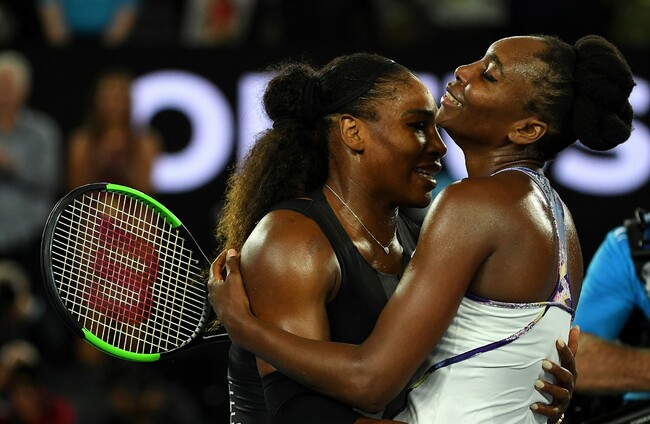PERHAPS YOUR EXPERIENCE is different and the older siblings in your family are actually better at sport than the younger ones.
Statistically speaking, though, your chances of reaching the top level in sport are higher if you are a younger sibling.
A thorough explanation of the ‘little sibling effect’ is one of the many nuggets of fascinating wisdom in the book The Best: How Elite Athletes are Made, co-authored by academic Mark Williams and sports writer Tim Wigmore.
Williams is an expert on, well… expertise and its acquisition in sport, with 18 books and 500 scientific articles on his CV, as well as stints as a consultant in a range of professional sports.
Williams’ latest release with Wigmore does exactly what it says on the tin, providing a very digestible account of how and why the best in sport become the best.
Younger siblings have a much higher chance of becoming elite sportspeople, with the opening chapter of Williams and Wigmore’s book detailing the data from studies in this field, as well as the factors that feed into it.
Among them is the fact that younger siblings have the chance to mimic the training approaches of their older siblings, while the older siblings can act as role models and coaches.
“When the younger sibling comes along, the parents are often already transporting the older sibling or siblings around to sports and training sessions,” says Williams on a video call from the UK.
“So the younger sibling gets dragged along and both observes the older sibling engaging in sport and also possibly engages themselves, even if it’s in an implicit experiential process around the main sport.
“Then normally what happens is the younger sibling might be attracted to that specific sport and he or she starts practicing at a young age.
“The older sibling has been in the sport for a longer time, obviously, and has more experience than the younger sibling and can begin to share that knowledge.”
Williams points out that there is an increasing amount of evidence that ‘dyadic learning’ two or more people attempting to learn something together – is more conducive to learning new skills than doing it solo.
Sometimes without even being aware of it, older siblings also provide valuable emotional support.
“Particularly as they get older, the siblings will talk more about their experiences and potentially share their problems,” says Williams.
“That’s part of the culture that surrounds families in sport and siblings in sport. It’s a strong source of knowledge, encouragement, and support for younger siblings.”
So clearly, the mentorship and support of an older sibling is a major advantage.
Citing the example of the Williams sisters, Venus and Serena, the opening chapter of The Best also pinpoints how younger siblings’ desire to keep up with their older siblings can be a powerful force in their growth as sportspeople.
“The younger sibling usually gets exposed to a higher level of competition at a younger age, if nothing else by virtue of the fact that they’ll be playing against the older sibling and his or her friends,” says Williams.
“If you want to be invited back to play next time, then you’ve got to be OK!”
Williams and Wigmore also explain how the competitive aspect of the sibling relationship can result in the younger sibling developing more refined technical skills and greater creativity.
Younger siblings are usually at a physical disadvantage when competing so need to make up for that by figuring out different ways to make an impression.
The development of creativity is a fascinating aspect of any athletic story. One other positive for younger siblings in this area is that they are likely to be part of informal games away from coach-led training sessions.
The Best cites the example of Andy Murray and his older brother, Jamie, making up all sorts of games as kids.
“There’s quite a lot of evidence across team sports that ‘street sport’ and informal games have many advantages and one of those is that kids tend to recreate situations and games they see live or on TV,” says Williams.
“There’s actually a high element of specificity in the practice.
“The other thing is that there’s usually no coaching, instruction, or feedback and it’s a very dynamic environment, particularly if you’re a younger sibling playing with those who are bigger and stronger physically than you.
“It’s an incredible source of opportunity to be creative and develop key skills.”
Williams contrasts informal games to the very prescriptive style of coaching that was particularly prevalent in the 1990s and early 2000s, much of which was drill-based practice that was repetitive and didn’t really relate to match play.
He welcomes the shift away from that style in more recent times, highlighting how professional Brazilian football clubs can’t access players until the age of 12 as one good example of the value of informal games.
“I’m not saying that coaching isn’t important. It is. But certainly from some of our data with elite Premier League academy players, we found that the ones who progressed onto the professional level have gathered more experience in ‘street football’ as well as the same amount of experience in a coach-led environment.
“Informal games are more dynamic, more variable, and present a lot more challenges for the learner to try and solve. In my opinion, that’s a hotbed for the development of creativity.”
The Best: How Elite Athletes are Made by A. Mark Williams and sports writer Tim Wigmore is published by Nicholas Brealey Publishing.
Originally published at 0900



